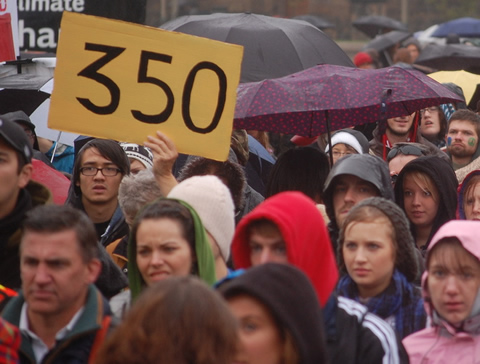With protest signs in one hand and umbrellas in the other, I and an estimated 3,000 youth activists descended upon Parliament Hill in late October for 350.org’s International Day of Climate Action. Dubbed “Fill the Hill,” the rally was one of more than 5,000 events going on around the globe.
It remains to be seen whether the rally will change the policies of Stephen Harper’s Conservative government leading up to the UN climate negotiations in Copenhagen this December. But the day was an inspiring example of what youth can accomplish when they come together to take a stand.
All different types of young environmental activists packed the Hill. Some shouted slogans such as “Green jobs now.” Others went from person to person with petitions and pens in hand. Some spoke to the media, and some simply made a mark with their quiet presence.
U of T students played a central role in organizing the Ottawa event. Joanna Dafoe, a fifth-year student in Peace and Conflict Studies and Environmental Policy, is the volunteer Canadian co-ordinator for 350.org – the organization behind Fill the Hill. (The group is named after 350 parts per million, the level scientists have identified as the safe upper limit for carbon dioxide in our atmosphere.)
For the past six months, Dafoe has supported groups across the country who wanted to get involved with “Fill the Hill.” As 350.org’s media contact on Saturday, she was quoted in several national news reports. Dafoe then spent much of Monday lobbying federal MPs about the importance of the Copenhagen summit.
Balancing such a high-demand position with her course readings, mid-terms, and essays isn’t easy. But Dafoe says it’s all worth it. “I had tears in my eyes as I watched in my hotel room the pictures roll in from all around the world. Knowing that children in Canada, Ethiopia and India rallied behind the same symbol gives me a sense of affirmation about the agency humans have to deal with climate change.”
Recent Posts
People Worry That AI Will Replace Workers. But It Could Make Some More Productive
These scholars say artificial intelligence could help reduce income inequality
A Sentinel for Global Health
AI is promising a better – and faster – way to monitor the world for emerging medical threats
The Age of Deception
AI is generating a disinformation arms race. The window to stop it may be closing





One Response to “ Gearing Up for Copenhagen ”
Be careful what you wish for. In this video, Britain's Lord Christopher Monckton outlines what he sees as the downsides of the Copenhagen treaty.